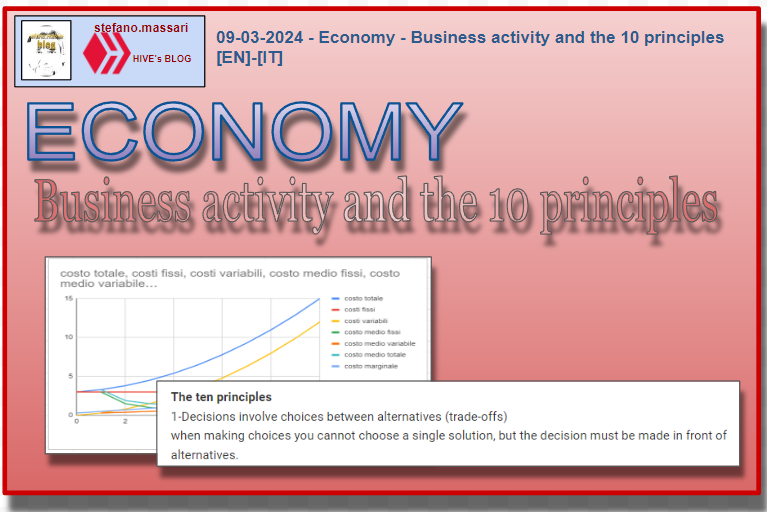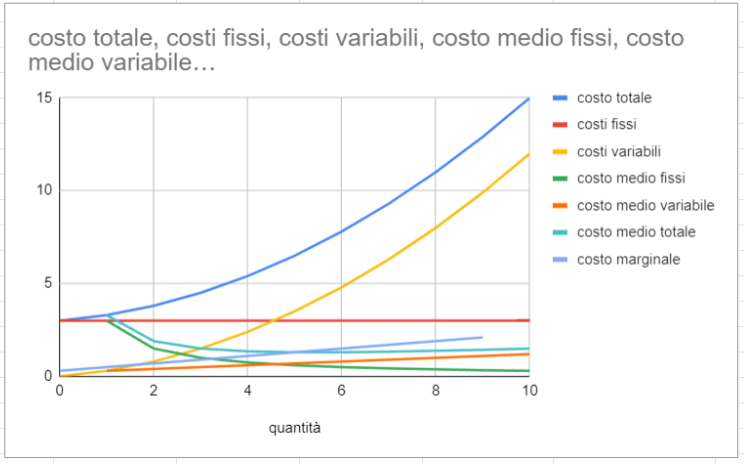09-03-2024 - Economy - Business activity and the 10 principles [EN]-[IT]

~~~ La versione in italiano inizia subito dopo la versione in inglese ~~~
ENGLISH
09-03-2024 - Economy - Business activity and the 10 principles [EN]-[IT]
Business activities
Business activities exist within the economic context. These business activities will therefore have a direct impact on the economic context but also on the social apparatus, furthermore they will also have an impact on the environmental and demographic context.
Business activities must:
-Comply with a series of legislative rules
-Comply with regulations
-Respect work rules
-Respect the legislative rules regarding the acquisition of raw materials
-Submit to market rules
-Submit to the rules of the factor market, i.e. land, labor and capital.
-Subject to the supply and demand market
There are many factors that influence businesses and decisions are made based on different aspects:
-Environmental aspects
-Technical aspects
-Social aspects
-Economic aspects
These aspects or factors are evaluated by individuals and after a certain period the positive or negative aspects of the decisions made will be evaluated
The objective of a company, after measuring the negative and positive aspects, is to mitigate the negative aspects and amplify the positive aspects. You should absolutely be aware that some negative aspects are difficult to eliminate, so it may not be worth spending time and money to eliminate them while leaving the positive aspects in a state of neglect.
The ten principles
1-Decisions involve choices between alternatives (trade-offs)
when making choices you cannot choose a single solution, but the decision must be made in front of alternatives.
2-The cost of something is what you have to give up to get it, so-called opportunity cost (cost opportunity)
3-Rational individuals and businesses think about the "margin"
You need to think about how many units are purchased, as the first units purchased will be useful, the others less and less.
4-Individuals and businesses respond to incentives.
We know how some sectors, such as the construction sector, move through incentives.
5-Exchange can be beneficial for everyone (Pareto optimal)
If virtuous policies are implemented, it means that no one will lose out, so it will be a positive action for everyone.
6-Markets are usually an effective tool for organizing economic activity
7-Sometimes state intervention can improve the result produced by the market
8-The standard of living of a country depends on its capacity to produce goods and services
9-Prices increase when the state prints too much money
10-Society faces a short-term trade-off between inflation and unemployment.
If we tend to make politics to encourage employment, we risk increasing inflation.
If we tend to engage in politics to curb inflation, there will consequently be less employment
Below is an example graph to measure some business factors
In the case presented below we relate the quantity to other variables which are: total cost, fixed costs, variable costs, average fixed cost, average variable cost, average total cost, marginal cost.

Conclusions
In business, the first of the ten principles says that when you have to decide something, you must always do so in front of alternatives.
Request
Are there any of the 10 principles that you like more than the others or that you consider more fundamental than the others?

ITALIAN
09-03-2024 - Economia - Attività d’impresa e i 10 principi [EN]-[IT]
Le attività d’impresa
All’interno del contesto economico esistono le attività d’impresa. Queste attività di impresa avranno quindi un impatto diretto sul contesto economico ma anche sull’apparato sociale, inoltre avranno anche un impatto sul contesto ambientale e demografico.
Le attività d’impresa dovranno:
-Rispettare una serie di regole legislative
-Rispettare le normative
-Rispettare le regole del lavoro
-Rispettare le regole legislative che riguardano l’acquisizione di materie prime
-Sottostare alle regole di mercato
-Sottostare alle regole del mercato dei fattori, cioè terra, lavoro e capitale.
-Sottostare al mercato della domanda e offerta
I fattori che influenzano le imprese sono molteplici e le decisioni vengono prese in base a diversi aspetti:
-Aspetti ambientali
-Aspetti tecnici
-Aspetti sociali
-Aspetti economici
Questi aspetti o fattori vengono valutati dagli individui e dopo un certo periodo si valuteranno gli aspetti positivi o negativi delle decisioni prese
L’obiettivo di un impresa, dopo aver misurato gli aspetti negativi e positivi, è quello di mitigare gli aspetti negativi e amplificare gli aspetti positivi. Bisogna assolutamente essere consapevoli che alcuni aspetti negativi difficilmente potranno essere eliminati, quindi potrebbe non valerne la pena spendere tempo e denaro per eliminarli mentre si lasciano gli aspetti positivi in uno stato di noncuranza.
I dieci principi
1-Le decisioni comportano scelte fra alternative (trade-off)
quando si fanno scelte non si può scegliere su una unica soluzione, ma la decisione deve essere presa davanti a delle alternative.
2-Il costo di qualcosa è ciò a cui si deve rinunciare per ottenerlo, cosiddetto costo opportunità (cost opportunity)
3-Gli individui e le imprese razionali pensano al «margine»
Bisogna pensare a quante unità vengono acquistate, in quanto le prime unità acquistate saranno utili, le altre sempre meno.
4-Gli individui e le imprese rispondono agli incentivi.
Sappiamo come alcuni settori, come quello edili, si muove attraverso agli incentivi.
5-Lo scambio può essere vantaggioso per tutti (Pareto ottimale)
Se si mettono in atto politiche virtuose, significa che nessuno andrà a rimetterci, quindi sarà un azione positiva per tutti.
6-I mercati sono di solito uno strumento efficace per organizzare l’attività economica
7-A volte l’intervento dello Stato può migliorare il risultato prodotto dal mercato
8-Il tenore di vita di un paese dipende dalla sua capacità di produzione di beni e servizi
9-I prezzi aumentano quando lo Stato stampa troppa moneta
10-La società si confronta con un trade-off di breve periodo tra inflazione e disoccupazione.
Se tendiamo a fare politica per l’incentivazione dell'occupazione rischiamo di far aumentare l’inflazione.
Se tendiamo a fare politica per frenare l’inflazione di conseguenza ci sarà meno occupazione
Qui di seguito un grafico di esempio per misurare alcuni fattori d’impresa
Nel caso qui sotto presentato mettiamo in relazione la quantità con altre variabili che sono: costo totale, costi fissi, costi variabili, costo medio fissi, costo medio variabili, costo medio totale, costo marginale.

Conclusioni
Nell'attività d'impresa, il primo dei dieci principi dice che quando si deve decidere qualcosa, lo si deve fare sempre davanti a delle alternative.
Domanda
C'è qualcuno dei 10 principi che vi piace più degli altri o che ritenete fondamentale più degli altri?
THE END
Quite a lot of principles that was learnt to actually make it more understanding
I'm very happy to see your comments on this topic too. We can summarize this article by saying that:
The decisions of individuals and businesses are dictated by numerous interdependent factors, and every business must comply with the ten principles of economics
Why I reblog this post is because I want to study and digest it not just read for entertainment.
Hi @mfontom , thanks for stopping by. Business activities are a very important part of the European economic system. In this area we can state the following:
The activities of a company take place within an economic, social and above all environmental context.
Companies must comply with a series of legislative rules-regulations regarding the method of acquiring raw and intermediate materials, personnel, production methods, compliance with labor regulations.
All of this is a mechanism that keeps an economy and its society afloat
The social and economic aspects are what affects the business most and it can be positive or negative
I love todays topic so much
HI @rafzat , I'm glad you like this topic, in the next few days I'll mix it together with the usual physics notions. I wanted to finish with the physics notions, but I noticed that I liked them and I admit that it's something I never expected. However, in this article I talk about the ten principles of economics and the ones I like best are listed below:
Principle 1: Decisions involve choices between alternatives
Principle 3: Rational individuals and businesses think at the “margin”
Principle 7: Sometimes state intervention can improve the outcome produced by the market
I was really able to grab a lot of things from this and this is great to see
In this article I talk about the principles of economics. What I like most of all is the first principle that I respected even before carrying out my economic studies.
Principle 1: Decisions involve choices between alternatives
I have never identified a single choice or a single solution.
10-La società si confronta con un trade-off di breve periodo tra inflazione e disoccupazione. questo è il mio approccio
Grazie @lupega per aver lasciato un commento. Ritengo importante gestire o creare bene i trade off (scambi o contropartite), in maniera da raggiungere accordi in breve tempo.